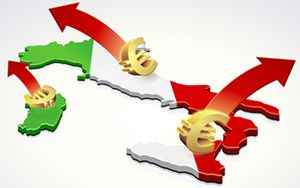(Finance) – Italy’s foreign trade in the end blames the economic-political crisis and, after five months of growth, there is one slowdown in exports both to EU countries and to non-EU markets. This is what theIstataccording to which in June there was an increase in imports (+ 1.8%) and a flexion for the exports (-2.1%). The monthly decrease in exports is due to the decline in sales to both areas, which was more intense for the EU area (-2.6%) with respect to the markets extra EU (-1.4%).
In the second quarter of 2022, however, the economic trend of exports is confirmed as very positive, although decelerating (+ 6.2%, from + 8% in the first quarter) and imports increase by 11.3%.
In June 2022 the trade deficit is 2,166 million euroscompared to a surplus of 5,673 million in June 2021. Il energy deficit it reaches 9,257 million (it was 2,637 million a year earlier). The surplus in the trade of non-energy products is reduced to 7,091 million, from 8,310 million in June 2021.
There trend variation still sees exports up by 21.2%, with sustained growth of similar intensity in both areas, EU (+ 21.2%) and non-EU (+ 21.1%). The import record a increase of 44.2%which involves the non-EU area to a much greater extent (+ 75.1%) than the EU area (+ 22.1%).
Between sectors which contribute most to the trend increase in exports are: refined petroleum products (+ 100.9%), pharmaceutical articleschemical-medicinal and botanicals (+ 47.8%), chemicals and substances (+ 30.0%), machinery and appliances nec (+ 10.1%) and food, beverages and tobacco (+ 19.6%) ).
THE partner countries the more active they are United States (+ 25.3%), Germany (+ 15.6%), France (+ 16.7%), Belgium (+ 54.0%) and Turkey (+ 87.4%). Exports to Russia (-19.1%) confirmed a sharp decline; sales to Switzerland also fell slightly (-2.2%).
In the first six months in 2022, the trend growth of exports (+ 22.4%) is due in particular to the increase in sales of base metals and metal products, excluding machinery and plants (+ 25.7%), pharmaceutical, chemical-medicinal and botanical items (+ 36.7%), refined petroleum products ( + 99.7%), chemicals and substances (+ 28.8%) and food, beverages and tobacco (+ 20.6%).
In June, i import prices rise by 1.8% on a monthly basis and del 21.5% on an annual basis (it was + 20.1% in May).
The comment
On an annual basis, export growth slows down but remains very strong, with increases spread to all sectors and to all the main partner countries, with the exception of Russia and Switzerland. Purchases of natural gas and crude oil contribute by 15.7 percentage points to the marked increase in imports from our country.
The energy deficit widened further, due to the strong increases in the average unit values of gas, crude oil and electricity imports, and exceeded 48 billion in the first six months of the year; in the same period, the trade deficit was close to 13 billion, compared with a surplus of almost 29 billion in the first six months of 2021.
In June, after the limited increase in May, the cyclical growth in import prices strengthened and began to accelerate on an annual basis; the increases in the prices of energy products in the non-euro area contribute above all.
